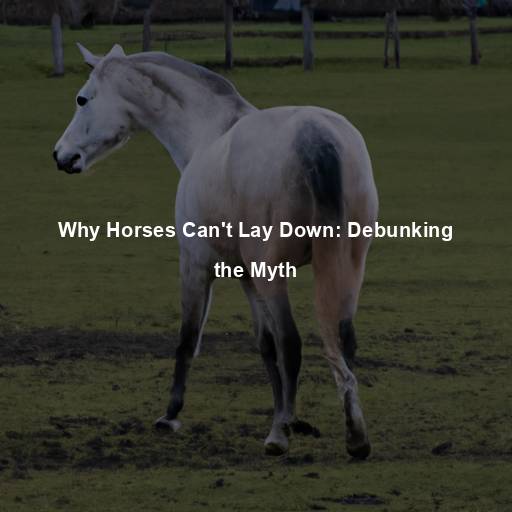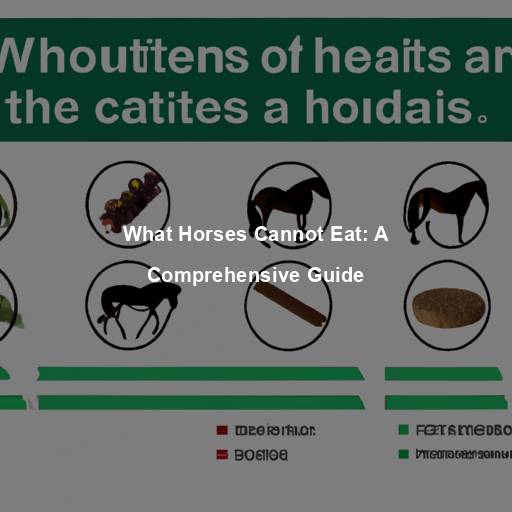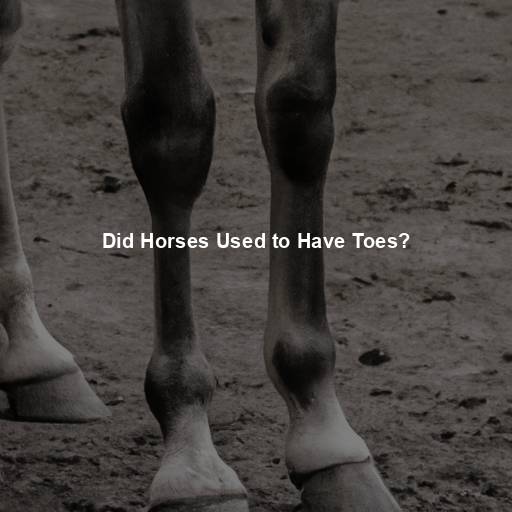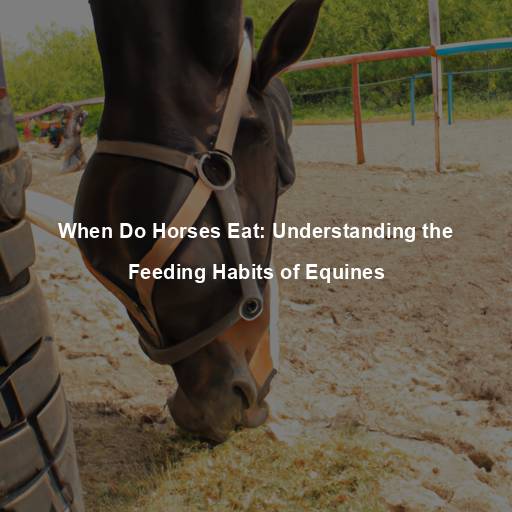Why Horses Can’t Lay Down: Debunking the Myth
Last Updated on July 29, 2023 by Evan
Contents [hide]
The Fascinating World of Horses
Horses have captivated human beings for centuries with their majestic beauty and incredible strength. They are often regarded as symbols of grace, freedom, and power. These magnificent creatures have been our companions, our means of transportation, and our trusted partners in various activities. However, there are several misconceptions surrounding horses, one of which is the belief that they cannot lay down.
The Myth: Horses Cannot Lay Down
It is commonly believed that horses cannot lay down due to their anatomical structure. According to this misconception, horses are physically incapable of lying down flat on the ground like most other animals. Instead, it is believed that they can only rest while standing or in a semi-reclining position. This myth has persisted over the years, leading to various assumptions about the sleeping habits of horses.
Debunking the Myth
Horses Do Lay Down
Contrary to popular belief, horses do indeed lay down. In fact, horses require sleep just like any other mammal. However, their sleeping patterns differ from those of humans and some other animals. While horses do sleep standing up at times, they also need to lay down for extended periods to achieve deep REM sleep.
The Importance of REM Sleep
REM (Rapid Eye Movement) sleep is a crucial phase of the sleep cycle in which dreams occur and memory consolidation takes place. Horses, being large and powerful animals, need to undergo REM sleep to maintain their physical and mental well-being. The ability to lay down enables them to enter this vital stage of sleep, promoting overall health and ensuring their cognitive functions remain sharp.
The Physiology of Horse Laying Down
The enigmatic allure of horses and their ability to gracefully recline has long puzzled the minds of curious onlookers. To unravel the secrets behind their equine ambivalence, one must delve into the intricate design of their bodies. Imbued with a mystifying mechanism called the “stay apparatus,” horses possess the astonishing capability to maintain an upright stance for prolonged durations without exerting much muscular strain. When these majestic creatures make the enigmatic decision to descend into a state of repose, this enigmatic mechanism is skillfully unlocked, resulting in the gradual flexing of their hind legs and a gentle descent towards terra firma.
The Role of Trust and Safety
Horses are prey animals by nature, and their survival instincts play a significant role in their behavior. When horses lay down, they are in a vulnerable position, as it takes them slightly longer to transition from a lying to standing position compared to other animals. Therefore, horses are more likely to lay down in environments where they feel safe and trust their surroundings. This trust is crucial for their well-being and explains why they are more likely to sleep lying down in familiar and secure locations, such as their own stables or pastures.
The Importance of Lying Down for Horses
Rest and Relaxation
As magnificent creatures of strength and grace, horses too find solace in the simple luxury of lying down. In this tranquil repose, they grant themselves a respite from the incessant burden their majestic frames bear whilst standing. An essential ritual for their equine well-being, this horizontal plunge into serenity enables their muscles and joints to find sweet relief, whilst ensuring optimal blood flow, thereby diminishing the hazards of conditions such as edema or swelling in their elegant lower limbs. With every gentle descent to the ground, horses gift themselves the opportunity to fully surrender, rejuvenate, and embrace a sublime state of physical equilibrium.
REM Sleep and Mental Health
When it comes to the well-being of our equine friends, it’s crucial to acknowledge the significance of REM sleep. This mysterious state of slumber plays a vital role in enhancing horses’ cognitive functions and overall mental health. In the depths of REM sleep, their brilliant minds weave a tapestry of memories and process information, fostering their learning and problem-solving abilities. By granting these majestic creatures the opportunity to indulge in a deep state of rest, we enable them to maintain mental clarity and emotional equilibrium, ensuring their optimal well-being.
Social Bonding and Grooming
Imagine this: have you ever seen horses lying down together? It turns out that this seemingly ordinary act is actually a social activity for these majestic creatures. When horses rest together, they engage in mutual grooming, unraveling a whole new world of connections within their social groups. Not only does this grooming routine promote hygiene, but it also cultivates stronger bonds and helps alleviate stress.
Overcoming Misconceptions
Challenging the Stereotypes
It is essential to challenge and debunk misconceptions surrounding horses, as they can perpetuate incorrect beliefs and misunderstandings. By understanding the truth about horses’ ability to lay down, we can provide better care for these remarkable creatures and ensure their physical and mental needs are met.
Creating a Safe Environment
Creating an optimal and serene sanctuary for our equine friends is vital to ensure their peaceful slumber. By offering cushy bedding, ample room to stretch their legs, and minimizing any disruptive elements, we can nurture their tranquility and foster a more restful sleep cycle. By embracing their innate instincts and catering to their unique requirements, we not only elevate their overall wellness but also forge a profound connection with these majestic creatures.
Polyphasic Sleep
When it comes to snoozing, horses are quite the peculiar creatures. Unlike us humans who enjoy a single, uninterrupted slumber, these majestic beings have mastered the art of polyphasic sleep. In simpler terms, they take multiple power naps throughout the day to fuel their energy. This adaptability has granted them the ability to catch some z’s while keeping their senses on high alert for any potential dangers lurking nearby.
The Power of Napping
Have you ever wondered how horses manage to stay energized and alert throughout the day? Well, it turns out that these magnificent creatures have a peculiar way of catching some shut-eye. Instead of indulging in long, uninterrupted slumbers like humans do, horses opt for short power naps that last mere minutes. These so-called “microsleeps” are scattered throughout the day and night, providing horses with much-needed rest without delving too deep into the realms of REM sleep.
Factors Influencing Horse Laying Down
Trust and Bonding
Horses are highly social animals and form strong bonds with their herd members. When horses feel safe and secure in their environment, they are more likely to lay down and enter deep REM sleep. This behavior is closely tied to their trust in their surroundings and the presence of familiar companions. Horses will often take turns keeping watch while others rest, creating a sense of security within the herd.
Environmental Factors
The quality of a horse’s slumber is intricately tied to its surroundings – the very environment it calls home. Ample pastures or expansive paddocks adorned with the embrace of soft, cozy bedding provide a haven for these magnificent creatures to recline their exhausted bodies and find solace in rest. Yet, there exists another crucial element – the whims of weather and the absence of any lurking danger. Only then will horses be bestowed with the audacity to surrender fully and indulge in the profound respite they seek.
Physical Comfort
Horses are large and powerful animals, and physical comfort is essential for them to lay down. If they are experiencing any discomfort, such as illness, injuries, or joint problems, they may choose to stay standing or adopt a semi-reclining position to alleviate the strain on their bodies. Ensuring their physical well-being through proper nutrition, regular exercise, and veterinary care can contribute to their ability to lay down comfortably.
Observing Horse Sleep Behavior
Signs of Deep Sleep
It’s truly a sight to behold when horses enter the realm of slumber. Their state of blissful tranquility reveals itself through a myriad of undeniable signs. Watch in awe as they gracefully recline on their side or even their back, their gentle eyes closing or gently peering through half-closed lids, while their entire being assumes an utterly relaxed posture. Witness the poetry of their slow and rhythmic breathing, a soothing symphony that confirms the depth of their slumber.
Safety Precautions
When it comes to our equine friends catching some z’s, it’s imperative to give them the respect they deserve. Interrupting their slumber can lead to quite the jolt, leaving them bewildered and potentially frantic. In the rare occasion where approaching a dozing horse is absolutely necessary, it’s best to approach with caution and serenity to minimize any startling effects.
Monitoring Sleep Patterns
As any equestrian enthusiast knows, the sleep habits of our majestic equine friends can be a fascinating yet perplexing subject. With their regal presence and graceful demeanor, horses have their own unique way of rejuvenating their bodies and minds. By closely observing their slumber patterns, including the duration and frequency of their naps, as well as their ability to enter deep sleep, we gain an intimate window into their well-being and overall health. This burst of knowledge can prove invaluable in identifying any potential concerns or shifts in behavior that deserve our utmost attention.
FAQs: Why Horses Can’t Lay Down
Why can’t horses lay down?
Horses, these majestic creatures with their elegant strides and powerful presence, have been perplexing researchers for years with their peculiar sleeping habits. Unlike humans, who find solace in the embrace of a cozy bed, horses have uniquely adapted to a different approach to slumber. With their remarkable anatomical structure, they find it arduous to fully lie down, compelling them to find rest while remaining in a standing position. This evolutionary innovation allows them to maintain a sense of alertness, constantly attuned to the slightest signs of danger lurking in their surroundings. It’s not just a matter of convenience, but a matter of survival for these magnificent beings.
Is it normal for horses to sleep while standing?
It’s quite intriguing how horses have their own unique way of catching some z’s. Believe it or not, these majestic creatures are capable of dozing off while standing, thanks to their extraordinary “stay apparatus” found in their legs. This special mechanism enables them to secure their joints and retain an upright position effortlessly, making it possible for them to steal moments of slumber while still maintaining their balance. Horses usually rest their hind legs by cleverly shifting their weight, while allowing their front legs to gently flex and release tension from their tendons. This uncanny technique allows them to recharge and conserve energy without the need to fully recline. Absolutely fascinating, isn’t it?
Do horses ever lay down to sleep?
While horses may not hit the snooze button as frequently as humans, they do have their own peculiar sleep patterns that keep them on their hooves. Unlike their snoozy counterparts, horses find solace in a serene and secure sanctuary before succumbing to a deep slumber. It may come as a surprise, but these majestic creatures opt for group napping sessions, collaborating in an open pasture where one vigilant horsey keeps watch while the others snore away. This symbiotic snoozing ritual fosters a protective atmosphere and heightens their survival instincts, making sleep a matter of strategic survival for these enigmatic equine beings.
Can medical conditions prevent horses from laying down?
Certainly! Some medical conditions can pose challenges for our equine friends when it comes to finding a comfortable position to rest. One particular condition, known as tying-up or recurrent exertional rhabdomyolysis, creates a perplexing situation for horses. When affected by this condition, horses encounter intense muscle cramps and distress, making it arduous for them to lie down. Consequently, these majestic creatures may require veterinary support and tailored treatments to alleviate their discomfort and maintain their overall health. To guarantee the well-being of horses with preexisting medical conditions, diligent monitoring and expert guidance become imperative.
Should I be concerned if my horse doesn’t lay down often?
It’s fascinating how horses have adapted to sleep while standing, prioritizing their survival instincts. However, it can sometimes be perplexing when you notice your horse displaying unusual behavior in terms of lying down. If you observe that your horse rarely takes the time to rest or appears restless and uncomfortable when doing so, it’s essential to seek professional advice from a veterinarian. This peculiar behavior could be an indication of underlying health problems or discomfort that demands attention. A thorough examination by a veterinarian will help shed light on the cause and offer the necessary guidance tailored to your horse’s unique situation.







